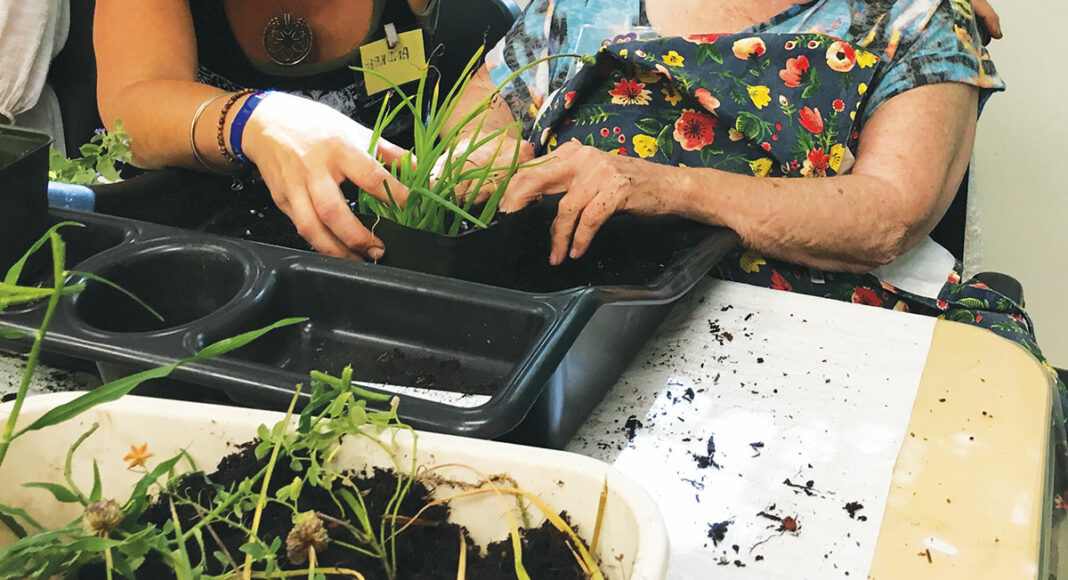Recently, Ella Fleming noticed something bizarre at her local gardening shops: Everywhere she went, Santa Cruz businesses were sold out of soil, seeds, and garden supplies.
“I’ve been farming for 12 years, and it’s the first time I’ve ever seen that. It’s like people are just obsessed,” says Fleming, the farm manager at the Homeless Garden Project. “It’s really incredible, I’m just so heartened by it.”
For Fleming, the timing of Santa Cruz’s gardening surge couldn’t be better. As unrest and uncertainty rise nationwide, she says the therapeutic effects of gardening can help quell some of the stress that many Santa Cruzans are feeling.
“Having some level of participation in your food system, in the food that you eat, is crucial right now. It has so many benefits for mental health,” she says. “I can attest to this in my own life and the lives of so many trainees who come here in severe mental health crises.”
The science seems to agree. Not only does gardening reduce the body’s cortisol levels, it can actually boost your mood and reduce feelings of anxiety, according to the National Center for Biotechnology Information.
“As shelter in place goes on, we’re definitely seeing a deterioration in people’s mental health,” says Tim Hartnett, registered therapist and executive director at the Shine a Light Counseling Center. “Gardening is one of the things we can do while sheltered-in-place that feels good and nurturing to us.”
In addition, gardening can offer necessary relief from “screen fatigue,” the exhaustion that often accompanies spending a 9-to-5 work day on the computer. This is particularly important as more services—and human interactions—are conducted virtually during shelter-in-place.
“As I’m spending more time on the computer, having sessions on the computer, the best way to make sure I get a good break in between counseling sessions is to go outside, put my hands in the earth and connect with nature,” says Hartnett.
To amplify these feel-good benefits further, Hartnett recommends gardening with a friend. “One of the main things we’re suffering from during shelter-in-place is social isolation,” he says. “Gardening is an activity you can do six feet apart, so you can even do it with someone with whom you’re not sheltering in place.”
Getting into the garden also boosts memory function, focus and self-esteem, says Trish Hildinger, a Santa Cruz-based horticultural therapist. At work, Hildinger relies on the therapeutic effects of gardening to assist clients with dementia, Alzheimer’s, and other physical or cognitive conditions. One study of 2,800 participants found that daily gardeners were 36% less likely to develop dementia later in life, according to the National Library of Medicine.
While Hildinger’s work might be a bit atypical, the world of Western medicine seems to be catching on. In 2018, Dignity Health Dominican Hospital opened its first “healing garden” to help patients undergoing physical or neurological rehabilitation. When announcing the project, hospital staff cited research that access to a garden can accelerate healing time, reducing the need for pain medication and shortening overall hospital stays.
“It’s definitely becoming more mainstream,” Hildinger says. “The science has finally caught up to what many of us knew intuitively: that anybody in a hospital, or in this situation with the pandemic, their physiological body benefits from a view of plants and gardens, even if they’re not in it.”

Trish Hildinger (left) is a Santa Cruz-based horticultural therapist, and LaTrina Candia (right) is working toward both her bachelor’s degree and her registration in horticultural therapy.
The garden also boasts major benefits for our physical health. “Being around dirt, getting dirty and occasionally getting a mouthful of the stuff when you’re crawling around actually serves to inoculate your intestines with beneficial bacteria,” says Dawn Motyka, a board certified holistic doctor who practices in Santa Cruz.
In turn, this beneficial bacteria boosts the immune system, making us less susceptible to diseases. Plus, it provides a low-maintenance, full-body workout which improves cardiovascular health and stamina, Motyka says.
If all that isn’t reason enough to start planting seeds, gardening might even get your kids to eat their vegetables. One study published in Science Daily found that children who help their parents garden are far more likely to consume high-vegetable diets and carry the habit into their adult lives.
Still, many people in urban or low-income communities lack access to outdoor spaces at all. In recent years, urban and community garden initiatives have tried to address this issue, but there’s still a long way to go in closing the access gap, Fleming says.
“I want every child, every human being, to at least be exposed to a garden,” she says. “For people that have some abundance in their life, I’d love for them to be able to share and support organizations doing garden education for kids in places where it’s harder to garden, places where it’s harder for people to have a little plot of land.”
Motyka echoes this sentiment, explaining that while gardening can provide much needed respite from daily stressors, it shouldn’t be used as a way to tune out bigger issues.
“I want it to be a balanced escape. I don’t want people to unplug totally and hide because I think this is an amazing opportunity for transformative change,” she says, referring to the nationwide protests for social justice. “We need to do some stewardship of our society, just the way you might ameliorate the soil in a garden by adding or changing things that aren’t working.”













